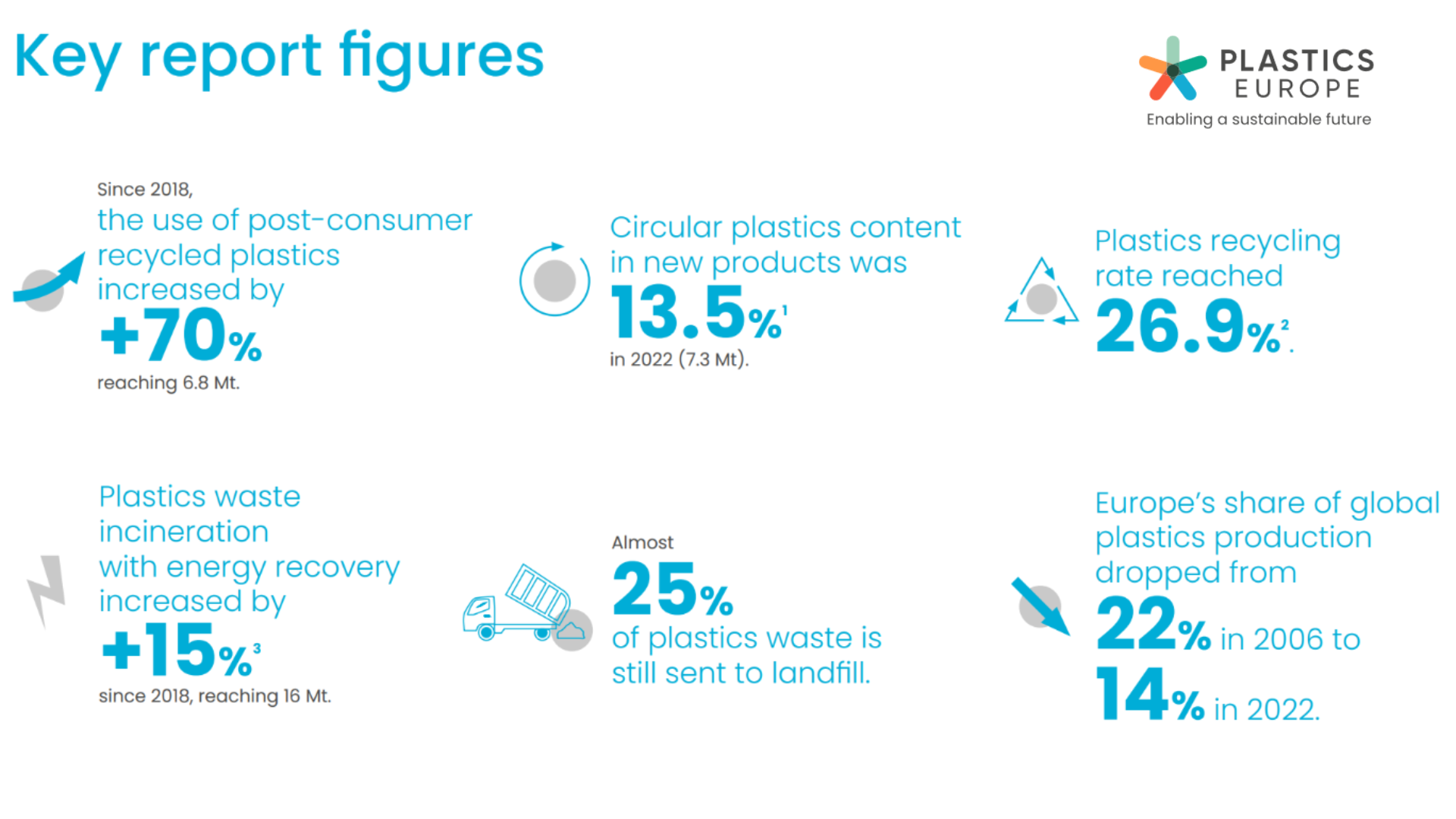The transition towards a circular economy for plastics is underway in Europe, and Spain is leading the way with notable progress in recycling and sustainability. The latest report from Plastics Europe outlines the milestones achieved and the challenges that industry and governments still face in reducing dependency on fossil resources.
Earlier this year, Plastics Europe published the findings of its study “The Circular Economy for Plastics“ revealing a significant breakthrough in the transition towards a circular economy in the plastics industry. The report highlights that the use of circular plastics has reached 13.5% in Europe, reflecting solid progress in incorporating recycled and non-fossil-based plastics into new products.
One of the most relevant achievements is that, for the first time, 26.9% of plastic waste generated in Europe is recycled, surpassing the amount sent to landfills. This milestone marks a crucial step in the sustainable management of plastic waste and underscores the continent’s commitment to reducing its reliance on landfills.

Spain Consolidates Its Position as a Leader in the Circular Economy of Plastics
In the case of Spain, the circular economy of plastics continues to show significant progress, consolidating the country as a European benchmark. Spain has surpassed the European average, with 21.7% of circular plastics in its total production, positioning it among the leaders in the adoption of recycled and non-fossil-based materials. This figure places Spain above the European average of 19.7%, reinforcing its commitment to sustainability and the transition to a more circular economy.
Moreover, the content of recycled plastics in new products in Spain is notably high, reaching 22.3%, almost double the European average of 12.6%. This leadership in the use of recycled plastics reflects the efforts made to improve recycling infrastructure and promote the circular economy in the industrial sector.
Spanish Circular Economy Strategy
One of the key factors in Spain’s leadership is the Spanish Circular Economy Strategy (España Circular 2030), approved in 2020. This strategy sets ambitious goals to reduce waste generation by 15% by 2030 and increase the use of recycled materials. This framework has been essential in promoting a greater selective collection of plastic waste and improving reuse across the country.
Progress in Waste Management
In the area of waste management, the Plastics Europe report highlights significant advances in the collection and treatment of plastics. For the first time, the selective collection of plastic waste has surpassed mixed waste collection in Europe, achieving a recycling rate that is eight times higher compared to mixed waste. This shift is a crucial step towards improving plastic circularity, as separately collected waste can be processed more efficiently.
Investments in waste collection and separation infrastructure have been key to achieving this goal. The combination of these efforts has resulted in a significant increase in recycled plastic waste, with more than one million tons recycled. These advances not only enhance waste management but also strengthen Europe’s commitment to the circular economy and environmental sustainability.
Virginia Janssens, Managing Director of Plastics Europe, stated: Our latest report “The Circular Economy for Plastics” provides essential insights into the transition of the plastics system. This edition also has a broader scope and contains more detailed data than ever before. While the data confirms that the shift towards circularity is firmly established and gaining momentum, it is frustrating that we continue to incinerate so much plastic waste when our industry desperately needs this potential feedstock to accelerate the transition. If urgent action is not taken to increase the availability of all circular plastic feedstocks, we will not be able to maintain the current pace of progress or realize the ambitions of our roadmap for the “Plastics Transition” and the “EU Green Deal”.
Challenges and Opportunities
The report also highlights that sectors such as packaging, construction, and agriculture are leading the use of recycled plastics, while others, such as the automotive and electronics industries, are significantly lagging behind. To continue making progress, the study calls for the need to increase the capacity for post-consumer plastic waste collection and sorting, as well as investments in innovative technologies such as chemical recycling, which complements mechanical recycling. The largest share (13.2% of all plastics produced) was mechanically recycled, while only 1% came from bio-based materials and 0.1% was chemically recycled.
The use of recycled content has increased by 70% since 2018, reaching 6.8 million tons, reflecting the industry’s clear commitment to advancing sustainability. However, the report also warns of the competitive challenges Europe faces compared to other regions of the world, which could hinder future progress if adequate policies are not implemented to encourage innovation and investments in the circular economy.
Source: Plastics Europe – Download report.

